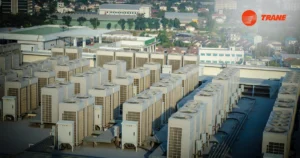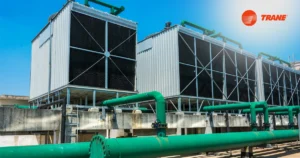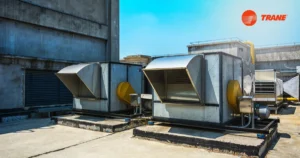Across the Emirates, industries are scaling at an unprecedented pace. From manufacturing and logistics to food processing and pharmaceuticals, the UAE is positioning itself as a global hub for innovation and trade. Yet, behind the ambition lies a critical challenge: maintaining efficiency and reliability in a climate where summer temperatures often exceed 45°C.
For factories, plants, and warehouses, heat is more than a comfort issue. It can disrupt operations, damage materials, and reduce productivity. That is why process cooling has become central to industrial competitiveness in the UAE.
The Cost of Inefficiency
Downtime is one of the most expensive risks in industrial environments. When cooling systems fail, machinery can overheat, raw materials may spoil, and production lines grind to a halt. Every hour of disruption translates into lost revenue, delayed deliveries, and reputational harm.
This risk is magnified in sectors like pharmaceuticals, where strict temperature requirements must be met to comply with global standards. For logistics and food processing, even minor temperature fluctuations can destroy entire shipments. In short, inefficient or unreliable cooling can undermine entire supply chains.
Why Cooling Is a Strategic Advantage
Cooling is often seen as a background utility. But in the UAE’s climate, it is a frontline enabler of growth. Process cooling systems allow industries to:
- Maintain the integrity of raw materials and finished goods.
- Protect equipment from overheating and premature wear.
- Safeguard worker wellbeing in demanding environments.
- Meet international quality and safety standards.
In a competitive global market, these factors determine whether businesses can deliver on time, scale effectively, and build trust with international buyers.
The Challenges Businesses Face
Industrial decision-makers in the Emirates frequently highlight three recurring challenges with their cooling infrastructure:
- Aging equipment that consumes excessive energy and delivers uneven performance.
- Sudden breakdowns that cause unplanned downtime in the hottest months.
- Limited flexibility to scale cooling capacity up or down during seasonal or project-based demand.
These pain points reveal why industries increasingly seek solutions that are both reliable and adaptable.
The Role of Modern Cooling Technology
Advancements in cooling technology are helping businesses move beyond outdated systems. Features such as variable-speed drives, smart controls, and eco-friendly refrigerants reduce both energy consumption and operating costs.
Modern process cooling solutions also bring greater precision, maintaining consistent temperatures even under fluctuating loads. This precision ensures that sensitive production processes — from bottling beverages to producing high-value pharmaceuticals — remain uninterrupted.
Applications Across Key UAE Sectors
The impact of process cooling stretches across multiple industries that are central to the UAE economy:
- Food and Beverage: Preventing spoilage during processing and storage.
- Pharmaceuticals: Ensuring strict temperature compliance for production and storage.
- Manufacturing: Protecting machinery and maintaining product quality.
- Logistics: Keeping warehouses and distribution hubs efficient under extreme heat.
Each of these sectors faces unique demands, yet they share the same need: cooling that is consistent, scalable, and dependable.
Cooling as Part of Sustainability Goals
The UAE’s Net Zero 2050 strategy places energy efficiency at the centre of industrial development. Since cooling accounts for a significant portion of electricity use, adopting advanced systems is both a business and environmental priority.
By integrating high-efficiency chillers and eco-friendly refrigerants, businesses can cut costs while demonstrating compliance with international sustainability standards. This is increasingly important as global buyers and partners favour supply chains with strong environmental credentials.
The Trane UAE Advantage
Trane UAE provides process cooling solutions designed specifically for the region’s extreme climate. Our approach goes beyond equipment, offering:
- A diverse fleet of rental units, ready for rapid deployment.
- Turnkey services, including site assessment, design, and installation.
- 24/7 technical support, reducing downtime risk.
- Energy-efficient systems that align with both business and sustainability goals.
By combining cutting-edge technology with responsive service, Trane enables UAE industries to maintain productivity, reduce risk, and compete globally.
Why Rental Matters
In addition to permanent solutions, rental cooling has become a critical strategy for industrial resilience. Rental options give businesses the flexibility to:
- Scale cooling capacity during seasonal peaks or new projects.
- Cover gaps during system breakdowns or maintenance.
- Access the latest technology without major capital expenditure.
This flexibility turns cooling from a fixed cost into a strategic advantage, ensuring operations can adapt quickly to changing market conditions.
Looking Ahead
As the Emirates continues to diversify its economy, industrial competitiveness will hinge on efficiency and resilience. Cooling, once considered a background utility, is now a frontline requirement. Businesses that invest in reliable process cooling — and leverage the flexibility of rentals — will be better positioned to thrive in an increasingly competitive global market.
Closing Thought
Industrial success in the UAE is built on more than ambition. It requires systems that protect processes, people, and products in one of the world’s harshest climates. With advanced expertise in temporary chiller rental, Trane UAE helps businesses stay competitive, efficient, and resilient.




